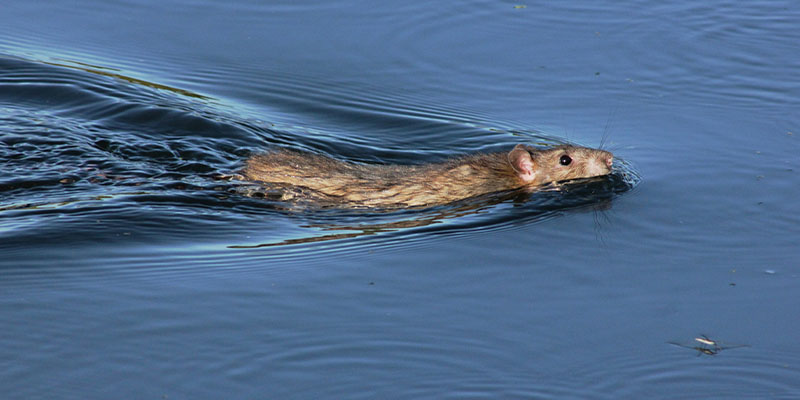Can Rats Swim? The Answer May Surprise (And Scare You, Too)
Spring season brings a fresh start to the year and in more ways than one. It allows property owners to beautify their landscapes, giving them a little extra, eye-catching curb appeal. Newly planted flowers and a little decor can really spruce up an exterior without spending a lot of money.
So, getting into the spring spirit, you fetch your gardening gloves and head outside. As you work around your house, you notice something peculiar – a tiny hole with gnaw marks around it. At first, you’re not sure what it is but then quickly realize you have unwanted Intruders. What makes it so strange is the fact that your pool is right there and that begs the question, can rats swim?
Well, to answer the question, you need to know what you’re dealing with. Regardless, the short answer is, yes, rats can swim. What’s more, they’re pretty adept at it. Moreover, you’d be surprised by how agile rats are in the water. So, let’s take a look at some interesting but unnerving facts.
Understanding Rats’ Swimming Abilities
Rats are remarkably adaptable creatures known for their survival skills and ability to thrive in various environments. One of their lesser-known talents is their impressive swimming ability. Rats can swim for up to three days without drowning and can tread water for extended periods. They are also capable of holding their breath for up to three minutes, which allows them to navigate through water pipes and sewers with ease! (Gross.)
Rats are strong swimmers thanks to their physical traits. Their elongated, muscular bodies and sharp claws enable them to paddle efficiently, while their buoyant fur helps keep them afloat. This swimming prowess allows them to traverse bodies of water, infiltrate homes through sewer lines, and reach areas that would otherwise be inaccessible.
The Risks for Jacksonville Homeowners
Jacksonville, with its humid subtropical climate and abundance of water bodies, provides an ideal habitat for rats. The city’s numerous lakes, rivers, and swamps create a perfect environment for these rodents to thrive. As a result, local homeowners must be vigilant in protecting their properties from rat infestations. Rats pose several risks to homeowners, including:
- Health hazards. Rats can carry diseases such as leptospirosis, hantavirus, and salmonella, which can be transmitted to humans through contact with their urine, feces, or saliva.
- Structural damage. Rats have strong teeth and can chew through various materials, including wood, plastic, and even electrical wiring, leading to costly repairs and potential fire hazards.
- Contamination. Rats can contaminate food supplies and living spaces with their droppings, urine, and fur, posing a significant hygiene risk.
Protecting Your Property
To safeguard your home from rat infestations, consider the following preventive measures:
- Seal entry points. Inspect your property for any gaps, cracks, or holes that rats could use to gain access. Pay close attention to areas around pipes, vents, and utility lines. Use materials such as steel wool, caulk, and metal mesh to seal these entry points effectively.
- Maintain cleanliness. Keep your home and yard clean and free of debris. Properly store food in airtight containers and dispose of garbage regularly. Reduce clutter in your attic, garage, and shed, as these areas can provide hiding spots for rats.
- Secure water sources. Rats are attracted to water sources, so ensure that your plumbing is in good condition and free of leaks. Regularly inspect and maintain your gutters, downspouts, and outdoor faucets to prevent standing water. Consider installing rat-proof covers on floor drains and sewer lines.
- Trim vegetation. Keep the vegetation around your home well-trimmed and away from the walls. Overgrown plants, shrubs, and trees can provide rats with shelter and easy access to your roof or attic.
- Use rat traps and deterrents. Place rat traps in areas where you suspect rat activity, such as sheds, garages, attics, and crawl spaces. There are various types of traps available, including snap traps, glue traps, and electronic traps. Additionally, consider using natural deterrents such as peppermint oil, which rats find unpleasant.
- Consult a professional. If you suspect a rat infestation or are unsure about how to protect your property, consider hiring a pest control professional. They can assess your home, identify potential entry points, and recommend effective solutions to keep rats at bay.
Understanding the swimming abilities of rats and taking proactive measures, will give Jacksonville homeowners the information they need to protect their properties from these resilient rodents. Stay vigilant and maintain a clean, secure environment to ensure your home remains rat-free.
Trust Trad’s When Dealing with Rats
If you suspect a rat problem or have discovered an infestation, don’t panic! Trad’s is here to help with all your pest care needs. Simply give us a call and one of our experienced technicians will come out to assess the problem and recommend appropriate and effective treatment solutions for your home or business. Don’t wait any longer; give Trad’s a call today!

